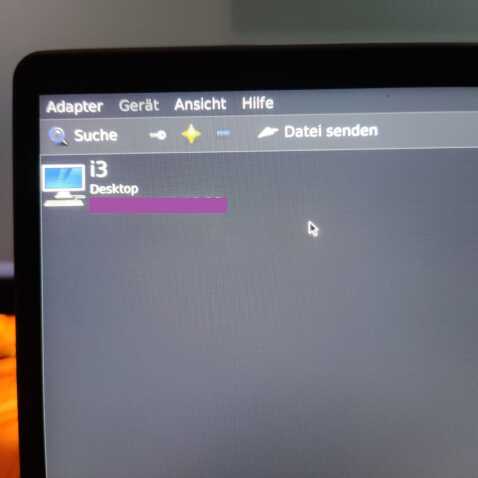As in the written title my bluetooth doesn't rly work. I even looked up some older topics related to this issue but didn't find smth. I already deactivated bluetooth in Windows 10. In Linux I can't use bluetooth unless I boot into Windows where I already deactivated bluetooth and then reboot into Linux. But it's a hassle. So I'd like to ask is there another way?
System: Kernel: 5.15.7-zen1-1-zen x86_64 bits: 64 compiler: gcc v: 11.1.0
parameters: BOOT_IMAGE=/@/boot/vmlinuz-linux-zen root=UUID=38b58c54-3840-4789-a13f-3eb8107c3279
rw rootflags=subvol=@ quiet splash rd.udev.log_priority=3 vt.global_cursor_default=0
systemd.unified_cgroup_hierarchy=1 loglevel=3
Desktop: KDE Plasma 5.23.4 tk: Qt 5.15.2 info: latte-dock wm: kwin_x11 vt: 1 dm: SDDM
Distro: Garuda Linux base: Arch Linux
Machine: Type: Desktop Mobo: ASRock model: X370 Taichi serial: <superuser required>
UEFI: American Megatrends v: P5.50 date: 04/18/2019
CPU: Info: 6-Core model: AMD Ryzen 5 1600 bits: 64 type: MT MCP arch: Zen family: 17 (23)
model-id: 1 stepping: 1 microcode: 8001137 cache: L1: 576 KiB L2: 3 MiB L3: 16 MiB
flags: avx avx2 ht lm nx pae sse sse2 sse3 sse4_1 sse4_2 sse4a ssse3 svm bogomips: 91210
Speed: 2622 MHz min/max: 1550/3800 MHz boost: enabled Core speeds (MHz): 1: 2622 2: 1638
3: 2048 4: 3136 5: 2381 6: 1562 7: 3190 8: 3060 9: 2623 10: 2686 11: 2537 12: 1613
Vulnerabilities: Type: itlb_multihit status: Not affected
Type: l1tf status: Not affected
Type: mds status: Not affected
Type: meltdown status: Not affected
Type: spec_store_bypass mitigation: Speculative Store Bypass disabled via prctl
Type: spectre_v1 mitigation: usercopy/swapgs barriers and __user pointer sanitization
Type: spectre_v2
mitigation: Full AMD retpoline, IBPB: conditional, STIBP: disabled, RSB filling
Type: srbds status: Not affected
Type: tsx_async_abort status: Not affected
Graphics: Device-1: NVIDIA GP106 [GeForce GTX 1060 6GB] vendor: ZOTAC driver: nvidia v: 495.44
alternate: nouveau,nvidia_drm bus-ID: 22:00.0 chip-ID: 10de:1c03 class-ID: 0300
Device-2: Cubeternet USB2.0 Camera type: USB driver: uvcvideo bus-ID: 1-5:3 chip-ID: 1e4e:0110
class-ID: 0e02
Display: x11 server: X.Org 1.21.1.1 compositor: kwin_x11 driver: loaded: nvidia
unloaded: modesetting alternate: fbdev,nouveau,nv,vesa display-ID: :0 screens: 1
Screen-1: 0 s-res: 3840x1080 s-dpi: 92 s-size: 1060x301mm (41.7x11.9") s-diag: 1102mm (43.4")
Monitor-1: HDMI-0 res: 1920x1080 hz: 60 dpi: 92 size: 531x299mm (20.9x11.8") diag: 609mm (24")
Monitor-2: DP-4 res: 1920x1080 dpi: 92 size: 531x299mm (20.9x11.8") diag: 609mm (24")
Message: Unable to show advanced data. Required tool glxinfo missing.
Audio: Device-1: NVIDIA GP106 High Definition Audio vendor: ZOTAC driver: snd_hda_intel v: kernel
bus-ID: 22:00.1 chip-ID: 10de:10f1 class-ID: 0403
Device-2: AMD Family 17h HD Audio vendor: ASRock driver: snd_hda_intel v: kernel
bus-ID: 24:00.3 chip-ID: 1022:1457 class-ID: 0403
Device-3: TC Electronic GoXLRMini type: USB driver: snd-usb-audio bus-ID: 1-2:2
chip-ID: 1220:8fe4 class-ID: 0102
Sound Server-1: ALSA v: k5.15.7-zen1-1-zen running: yes
Sound Server-2: JACK v: 1.9.19 running: yes
Sound Server-3: PulseAudio v: 15.0 running: yes
Sound Server-4: PipeWire v: 0.3.40 running: yes
Network: Device-1: Intel Dual Band Wireless-AC 3168NGW [Stone Peak] driver: iwlwifi v: kernel
bus-ID: 1c:00.0 chip-ID: 8086:24fb class-ID: 0280
IF: wlp28s0 state: down mac: <filter>
Device-2: Intel I211 Gigabit Network vendor: ASRock driver: igb v: kernel port: d000
bus-ID: 1e:00.0 chip-ID: 8086:1539 class-ID: 0200
IF: enp30s0 state: up speed: 100 Mbps duplex: full mac: <filter>
Bluetooth: Device-1: Intel Wireless-AC 3168 Bluetooth type: USB driver: btusb v: 0.8 bus-ID: 1-9:5
chip-ID: 8087:0aa7 class-ID: e001
Report: bt-adapter ID: hci0 rfk-id: 1 state: up address: N/A
Drives: Local Storage: total: 2.8 TiB used: 289.35 GiB (10.1%)
SMART Message: Unable to run smartctl. Root privileges required.
ID-1: /dev/nvme0n1 maj-min: 259:0 vendor: Samsung model: SSD 980 PRO 1TB size: 931.51 GiB
block-size: physical: 512 B logical: 512 B speed: 63.2 Gb/s lanes: 4 type: SSD serial: <filter>
rev: 3B2QGXA7 temp: 38.9 C scheme: GPT
ID-2: /dev/sda maj-min: 8:0 vendor: Seagate model: ST3320418AS size: 298.09 GiB block-size:
physical: 512 B logical: 512 B speed: 3.0 Gb/s type: HDD rpm: 7200 serial: <filter> rev: CC44
scheme: MBR
ID-3: /dev/sdb maj-min: 8:16 vendor: Toshiba model: DT01ACA100 size: 931.51 GiB block-size:
physical: 4096 B logical: 512 B speed: 6.0 Gb/s type: HDD rpm: 7200 serial: <filter> rev: A750
scheme: MBR
ID-4: /dev/sdc maj-min: 8:32 vendor: A-Data model: SU800 size: 238.47 GiB block-size:
physical: 512 B logical: 512 B speed: 6.0 Gb/s type: SSD serial: <filter> rev: 8BS scheme: MBR
ID-5: /dev/sdd maj-min: 8:48 vendor: Crucial model: CT500MX500SSD1 size: 465.76 GiB block-size:
physical: 512 B logical: 512 B speed: 6.0 Gb/s type: SSD serial: <filter> rev: 023 scheme: GPT
Partition: ID-1: / raw-size: 931.22 GiB size: 931.22 GiB (100.00%) used: 212.95 GiB (22.9%) fs: btrfs
dev: /dev/nvme0n1p2 maj-min: 259:2
ID-2: /boot/efi raw-size: 300 MiB size: 299.4 MiB (99.80%) used: 580 KiB (0.2%) fs: vfat
dev: /dev/nvme0n1p1 maj-min: 259:1
ID-3: /home raw-size: 931.22 GiB size: 931.22 GiB (100.00%) used: 212.95 GiB (22.9%) fs: btrfs
dev: /dev/nvme0n1p2 maj-min: 259:2
ID-4: /var/log raw-size: 931.22 GiB size: 931.22 GiB (100.00%) used: 212.95 GiB (22.9%)
fs: btrfs dev: /dev/nvme0n1p2 maj-min: 259:2
ID-5: /var/tmp raw-size: 931.22 GiB size: 931.22 GiB (100.00%) used: 212.95 GiB (22.9%)
fs: btrfs dev: /dev/nvme0n1p2 maj-min: 259:2
Swap: Kernel: swappiness: 133 (default 60) cache-pressure: 100 (default)
ID-1: swap-1 type: zram size: 31.34 GiB used: 0 KiB (0.0%) priority: 100 dev: /dev/zram0
Sensors: Message: No sensor data found. Is lm-sensors configured?
Info: Processes: 349 Uptime: 1h 10m wakeups: 0 Memory: 31.34 GiB used: 4.87 GiB (15.5%) Init: systemd
v: 249 tool: systemctl Compilers: gcc: 11.1.0 clang: 13.0.0 Packages: pacman: 1567 lib: 364
Shell: fish v: 3.3.1 running-in: konsole inxi: 3.3.09



